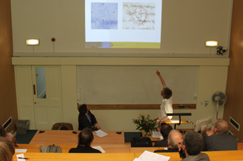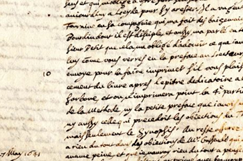Seminar 3: Loss, Theft, and Forgery of Descartes’s Letters
Tags: Archives, Editions, Forgery, Loss, René Descartes, Theft

Erik-Jan points out the stamp which, when viewed under UV light, alerted him to the stolen Libri letter.

The stolen letter on the 'Meditations', discovered by Erik-Jan at Haverford College in 2010.
In the third paper of our seminar series on Thursday 19 May, Dr Erik-Jan Bos (University of Utrecht) gave a talk entitled ‘To the Editor’s Delight: The Loss, Theft, and Forgery of Descartes’ Letters’. In a fascinating and playful analysis, Bos described some of the most outrageous examples of intellectual fraud and finagling he has encountered during his intensive work on the 750-letter corpus. These include the mysterious disappearance of the Stockholm chest in the early 1700s (one of two left to posterity by the French philosopher); omissions, elisions, and other dubious practices by Claude Clerselier, the first editor of the correspondence; the pilfering of around eighty letters by the voracious eighteenth-century manuscript collector Guglielmo Libri (one of which, previously unknown, was discovered by Erik-Jan in Haverford College in 2010); and some sensational and implausible nineteenth-century counterfeits created by forger Denis Vrain-Lucas and sold to the unwitting mathematician and collector Michel Chasles, who proclaimed their authenticity to the French Academy of Science. A lively discussion focused on attempts to reconstruct the contents of the Stockholm chest, the circumstances surrounding Erik-Jan’s discovery of the lost Libri letter in a Pennsylvania library, and the reasons for the surprisingly high percentage of out letters in the Cartesian corpus (570 surviving letters are from him, and only 180 to him). Seminars take place in the Faculty of History on George Street on Thursdays at 3pm. For future talks in the series, please see the seminar webpage.


 Join
Join 